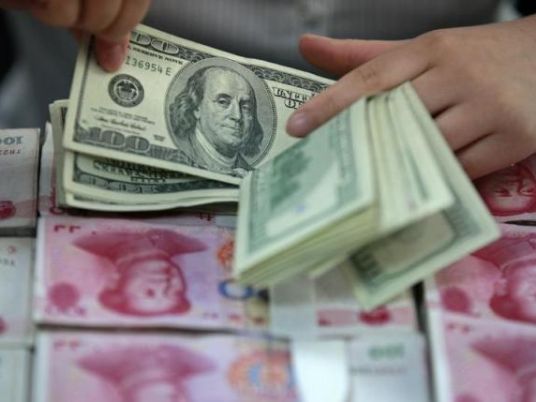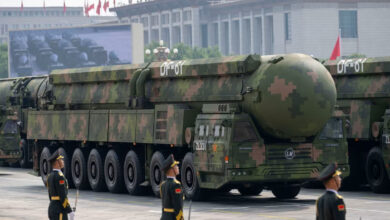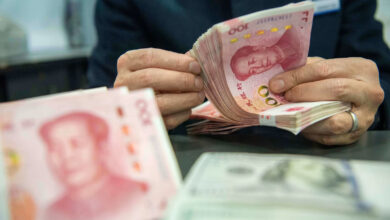
China's 2 percent devaluation of the yuan on Tuesday pushed the US dollar higher and hit Wall Street and other global equity markets as it raised fears of a new round of currency wars and fed worries about slowing Chinese economic growth.
US stock indices dropped more than 1 percent and stocks also fell in Asia and Europe as investors contemplated the implications of a move designed to support China's slowing economy and exports. The MSCI All World Index .MIWD00000PUS of global shares fell 1.16 percent.
"What is good for growth in China is unfortunately bad for everybody else," said Bill McQuaker, co-head of multi-asset at Henderson Global Investors.
The Dow Jones industrial average .DJI fell or 1.4 percent to 17,368.54. The S&P 500 .SPX lost 1.17 percent and, to 2,079.64 and the Nasdaq Composite .IXIC dropped or 1.31 percent to 5,035.01.
Companies that sell to China were hit hard, with heavy equipment maker Caterpillar (CAT.N) losing 3.13 percent and Germany's Volkswagen (VOWG.DE) dropping 4 percent. Energy and materials shares also tumbled on China demand concerns, with Exxon Mobil dropping 1.76 percent.
The pan-European FTSEurofirst 300 index .FTEU3 lost 1.68 percent, led lower by car makers and luxury goods companies, whose products are now more expensive for Chinese consumers.
Against the trend, Greek shares .ATG gained 2.14 percent after Athens secured a third bailout deal with creditors.
On Chinese stock markets, airlines and importers fell, though exporters rose. The CSI300 index .CSI300 of the largest listed companies in Shanghai and Shenzhen lost 0.4 percent and the Shanghai Composite .SSEC closed flat.
Biggest fall in yuan since 1994
China's move, which the central bank described as a "one-off depreciation" based on a new way of managing the exchange rate that better reflected market forces, triggered the yuan's biggest fall since 1994, pushing it to its weakest against the US dollar CNY=CFXS in almost three years.
In a potentially worrisome sign, China's offshore yuan CNH=, a more liquid instrument traded out of Hong Kong, fell 2.9 percent, exceeding the fall in the onshore yuan. It suggests more possible losses for the onshore currency, as the Hong Kong-traded yuan tends to act as a precursor to the onshore.
Emerging market currencies, which have already fallen sharply in the past year as the US dollar has strengthened, slumped again.
The Malaysian ringgit MYR= and the Indonesian rupiah IDR= hit lows not seen since the Asian financial crisis 17 years ago while the US dollar gained 2.2 percent against Brazil's real BRL=, putting it in range of levels not seen since 2003.
The Australian dollar AUD=D4, often used as a liquid proxy for the yuan, fell 1.2 percent to $0.7322. Investors who had held euro-funded yuan positions bought back the single currency, pushing it up EUR= 0.2 percent to $1.1042.
The weakness in stocks boosted top-rated bonds. German 10-year yields DE10YT=TWEB fell 5 basis points to 0.64 percent and US equivalents US10YT=RR dropped 11 basis points to 2.1248 percent.
The devaluation also rippled through commodity markets, driving oil prices down after Monday's hefty gains and pushing copper futures to a six-year low.
Oil prices fell as dollar-priced commodities became more expensive, weighing on demand. Brent crude LCOc1 was down 2.7 percent to $49.03. Copper futures CMCU3 lost 3.5 percent to $5,130.50 per tonne.
Gold XAU= fell to as low as $1,093.25 before recovering to around $1,105 an ounce.
Currency wars?
Washington has for years pressed Beijing to liberalize its control of the yuan to allow it to strengthen given China's high rate of economic growth and massive exports.
But Chinese economic growth is now slowing and the new exchange rate mechanism gives markets greater ability to push the yuan lower, just as the United States prepares to raise interest rates, a step that may add further to US dollar strength.
Investors are now wondering whether China's devaluation will keep the Federal Reserve from raising rates in September as many anticipate.
"People seem to be trading this as a reason for Fed delay," said Michael Wallace, global market strategist at Action Economics in San Francisco. "This puts the Fed tightening horizon back on the table in terms of discussion."
The big question now for emerging markets, where economic growth has slowed and capital flight has increased, is whether their officials respond to China's move in kind.
"The key will be the response of other central banks … There should be further pressure on the currencies of China's trade partners," said Nick Lawson, managing director at Deutsche Bank in London.




